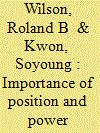| Srl | Item |
| 1 |
ID:
138771


|
|
|
|
|
| Summary/Abstract |
Recent conflict research acknowledges the long-ignored intertwined nature of social conflict and environmental vulnerability; findings show that natural disasters affecting conflict regions can catalyse pre-disaster conflict developments. It is, however, unclear why disasters sometimes contribute to conflict escalation and sometimes to mitigating conflict. Drawing from the contrasting post-tsunami experiences of Sri Lanka and the Indonesian province of Aceh, this article investigates the tipping effects and asymmetrical impact of international relations, political participation and economic sustainability on post-disaster peacebuilding. Evidence shows that the domestic capacity for peacebuilding critically depends on the nature of international support. While Sri Lanka and Indonesia have many similarities, the latter’s major geopolitical relevance guaranteed sufficient, credible and targeted peacebuilding support, while the former received limited support and faced competing internal demands from Tamil and Sinhalese areas, thereby further restricting the potential for effective peacebuilding.
|
|
|
|
|
|
|
|
|
|
|
|
|
|
|
|
| 2 |
ID:
160349


|
|
|
|
|
| Summary/Abstract |
This paper analyzes how U.S. foreign policy, based on symmetry or asymmetry,
drives international relations, and can lead to positive or negative state-to-state
relations. The paper uses the case of U.S. foreign policy towards North Korea to
discuss the importance of position and power when dealing with societies and
nations. The paper discloses that U.S. foreign policy approach towards North Korea
has not significantly evolved over the past 60 years regardless of administration
and that the current paradigm of dealing with complex state-to-state issues only
works to sustain negative relations. The paper further finds that the continued
negative relations and deep-rooted and protracted conflict between the United States
and North Korea is intimately connected to the way in which the United States
handles state-to-state relationships. On the basis of these observations, the paper
recommends alternative multi-dimensional foreign policy approaches based on
conflict analysis and resolution methods and tools needed to successfully transform
the relationship and build sustainable peace with North Korea and in the East Asia
Region.
|
|
|
|
|
|
|
|
|
|
|
|
|
|
|
|